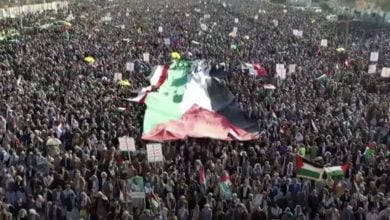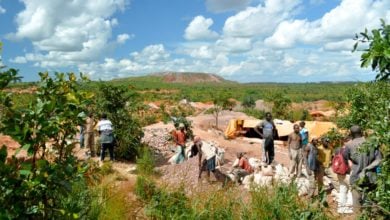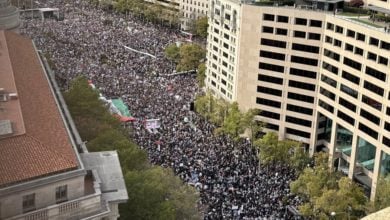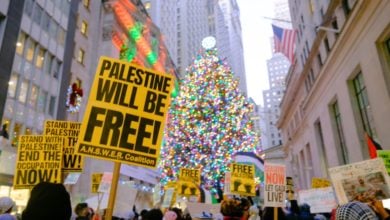Photo: Former Nigerien President Mohamed Bazoum meets with Secretary of State Blinken last year in New York City. Public domain.
The military takeover of the government in Niger has been met by threats of an imperialist-orchestrated invasion that could trigger war across the entire region. The situation is evolving rapidly, with each passing day bringing an intensification of the struggle. All people who oppose U.S. militarism and support independence for the people of Africa should pay close attention to this critical front of the fight. These six key players in the crisis will play a central role in the outcome of the dramatic events that are unfolding.
The new Nigerien government
On July 26, the military of Niger deposed the pro-western government of Mohamed Bazoum. That effort was led by the commander of the presidential guard, General Abdourahmane Tchiani. Tchiani’s coup was supported by the bulk of the military, which now governs the country as the National Council for the Safeguard of the Homeland, forming an interim cabinet on August 10. The Council is still in the early days of articulating its political and economic program, but has declared its aim is to end the neo-colonial domination Niger has endured for decades under France and the United States. This has been met with widespread popular support. The most massive expression of this took place on August 6, when approximately 30,000 people packed a stadium for a rally in defiance of threats of foreign intervention. There have also been militant protests at the French embassy.
The ousted Nigerien government
Under Bazoum’s rule, Niger became one of the last remaining strongholds of western military and political influence. A French-led military alliance has been supposedly waging war against religious fundamentalist armed groups — that are as strong as ever — in the region for nearly ten years. But as the people of West Africa rise up against this military campaign and the neo-colonial relationship it is meant to protect, there are fewer and fewer countries willing to host western troops. The Pentagon’s Africa Command maintains a massive drone installation at Niger Air Base 201 near the city of Agadez. Establishing this base was the largest construction project ever undertaken by the U.S. Air Force. The Pentagon has about 1,100 troops based in Niger, and France has approximately 1,500. Bazoum is currently being held under house arrest, and is facing charges of high treason for conspiring with foreign powers to undermine his country’s sovereignty.
ECOWAS
The Economic Community of West African States was formed in 1975 and now has 15 member states. It has always functioned as a tool for western powers to coordinate the policies of their loyal client regimes in the region. ECOWAS maintains a military “standby force” composed of troops from the different member states. ECOWAS states have already suspended Niger’s membership and imposed economic sanctions targeting the country, but are now threatening to go a step further and carry out an invasion. Western imperialist powers would prefer to use regional proxies like ECOWAS to carry out intervention in the name of “democracy” rather than having to take the risk of waging a direct war. At an August 6 summit, ECOWAS agreed to activate their standby force, but have not yet committed to specific details for a military intervention.
Governments of Mali, Burkina Faso, Guinea
A wave of coups in the past several years has established a bloc of governments that have asserted their nations’ sovereignty and pursued an independent foreign and security policy. In 2021, Colonel Assimi Goïta took power in Mali. Colonel Mamady Doumbouya followed suit in Guinea later that year, and last September, Captain Ibrahim Traoré became the interim president of Burkina Faso. They have voiced their opposition to the failed French-led counterinsurgency campaign and have pursued alliances with other partners, including Russia, to secure their countries. Mali and Burkina Faso have stated that an ECOWAS invasion of Niger would be considered a declaration of war on their countries as well, and Guinea is also an ally of the new government in Niger. These new governments — along with the new government in Niger — involve civilian and military officials who held prominent positions within the traditional elite, but at the same time are expressing mass sentiment in favor of independence. Out of this contradictory situation, a number of different political currents and trajectories could arise as the new governments grapple with the realities of pursuing national development in an economic context dominated by western banks and corporations.
People’s movements of West Africa
West Africa has a long tradition of mass movements struggling for independence and socialism. Left organizations have noted the political possibilities that have opened up as a result of this regional wave of anti-colonial sentiment, and the extreme danger that an imperialist-backed ECOWAS intervention would hold. The Socialist Movement of Ghana pointed out that “The real beneficiaries of an ECOWAS attack on Niger are Western Imperialist forces. France is struggling to sustain generations of the cruel plunder and oppression that West Africans have rejected. Without Nigerien uranium, French electricity costs will rise significantly plunging that country into deeper crisis.” The regional network West African People’s Organization demanded that, “the sovereignty of the Niger people, in all situations, must be respected, as they alone are in a position to decide the future direction of their country, and no one else.” And the Communist Party of Benin declared that, “The African peoples and those of our sub-region are engaged in a fight to the death against the imperialist powers, and in particular against FrançAfrique [system of regional domination by France]. All those who oppose this inexorable march will be consigned to the dustbin of history.”
The French and U.S. governments
The dominant imperialist powers in the region, France and the United States are deeply concerned that their stranglehold over West Africa is slipping at a time when the entire continent has become a priority area for new Cold War “great power competition” against Russia and China. Plundering Niger’s resources is especially crucial to uranium-dependent France. For the United States, Niger is a key military outpost as the Pentagon seeks to expand its Africa Command. They want to restore the old government to power in Niger, but are afraid of becoming directly bogged down in deadly fighting and a potentially long and costly occupation. So they want their regional puppets to do the fighting for them. Foreign Minister Catherine Colonna said that France, “supports with firmness and determination the efforts of ECOWAS to defeat this coup attempt.” There are also indications that the wellbeing of former president Bazoum could be the pretext for an invasion that would be billed as a rescue mission to the public. U.S. Secretary of State Blinken said on August 10, “Like ECOWAS, the United States will hold the Council for the Safeguard of the Homeland accountable for the safety and security of President Bazoum, his family, and detained members of the government.”






